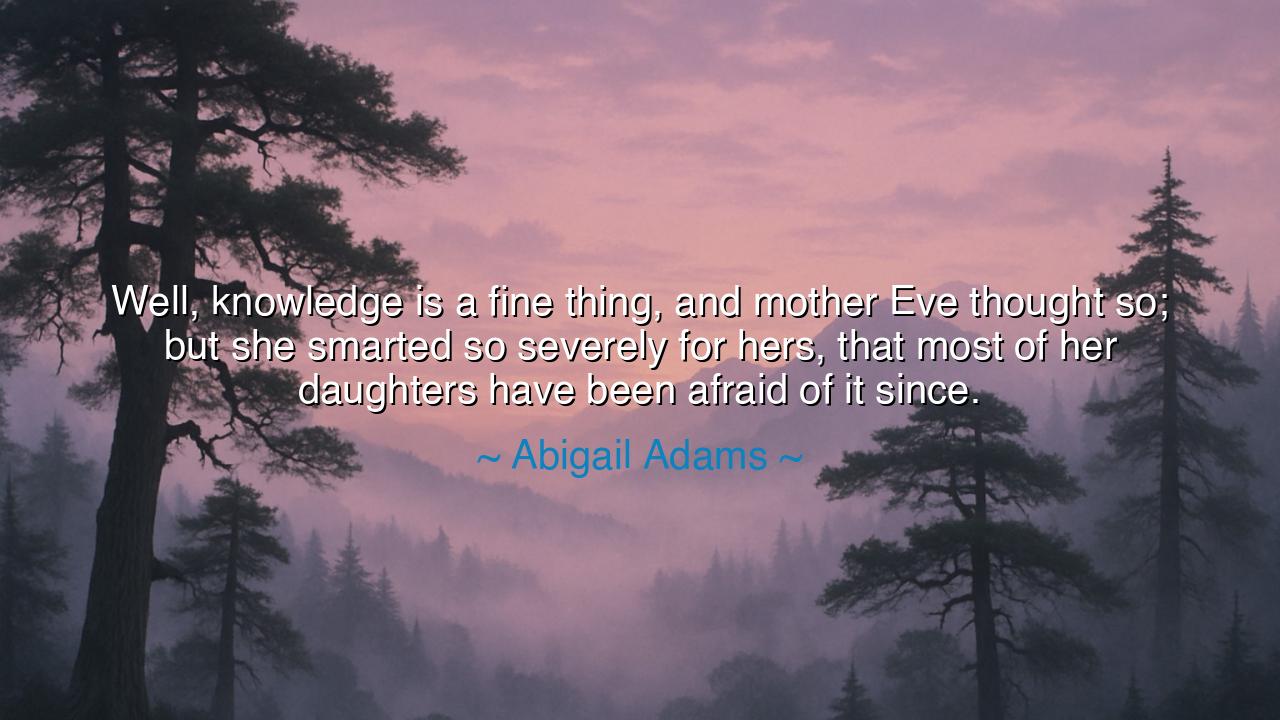
Well, knowledge is a fine thing, and mother Eve thought so; but
Well, knowledge is a fine thing, and mother Eve thought so; but she smarted so severely for hers, that most of her daughters have been afraid of it since.






The matriarch of America’s early republic, Abigail Adams, spoke with wit and depth when she said: “Well, knowledge is a fine thing, and mother Eve thought so; but she smarted so severely for hers, that most of her daughters have been afraid of it since.” With these words she binds together the ancient story of Genesis with the struggles of women in her own time, weaving a lesson about the hunger for truth, the cost of curiosity, and the fear that has long chained half of humanity.
She begins with Eve, the first seeker of knowledge, who reached for the fruit of wisdom though it was forbidden. In the ancient tale, her daring brought both enlightenment and suffering; she opened her eyes, but she was cast from paradise. Thus, Adams suggests, the punishment of Eve has echoed through the centuries—not only as myth, but as a justification for the oppression of women. The lesson society drew was not that wisdom is precious, but that women must be warned against its pursuit. The burden of Eve’s choice became the silence of her daughters.
Abigail Adams lived in an age when women were taught to prize obedience above learning, beauty above wisdom, and submission above independence. Her words reveal her sharp awareness of this injustice. She knew that knowledge is indeed “a fine thing,” the foundation of liberty and dignity, but she saw how the old story of Eve had been twisted into a weapon: to shame women away from study, to frighten them with the specter of pride, to persuade them that to learn was to sin. What began as Eve’s courage became, in the hands of men, an excuse for women’s ignorance.
History itself provides vivid examples of this fear. The scholar Hypatia of Alexandria, a woman of brilliance in mathematics and philosophy, was murdered by a mob who feared her wisdom. Medieval women who dared to study medicine were accused of witchcraft. Even in Adams’s own day, women were often barred from universities, their minds dismissed as fragile, unsuited for serious study. The curse of Eve’s punishment lingered, not as divine decree, but as social control.
And yet, Adams herself stood as proof that the daughters of Eve need not be afraid. Though denied formal schooling, she educated herself in literature, philosophy, and politics. She counseled her husband John Adams with letters filled with insight, and she urged him—famously—to “remember the ladies” when shaping the laws of the new republic. Her very life was a defiance of the fear she described: that women must shrink from knowledge lest they suffer. Instead, she claimed knowledge as her right, her strength, her inheritance.
The deeper meaning of her words is this: knowledge is costly, but ignorance is far more dangerous. To shrink from wisdom out of fear is to remain in bondage, while to embrace it, even at risk, is to taste freedom. Eve may have “smarted” for her daring, but she also opened the door to human awakening. Likewise, women who seek learning may face opposition, ridicule, or scorn, but in their pursuit they claim their rightful place as equal bearers of reason and truth.
The lesson for us is clear: let no fear keep you from seeking knowledge. Do not be deterred by old myths misused to bind you, nor by voices that whisper that wisdom is dangerous. Know that to learn is to live fully, and to deny learning is to shrink the soul. Parents, teach your daughters as well as your sons; citizens, demand schools and opportunities for all. For only when both men and women embrace knowledge freely will society flourish in justice and strength.
Thus, Abigail Adams’s words resound across time as both warning and challenge: Eve paid dearly for her pursuit, and her daughters have feared ever since—but fear must not rule the future. Let us honor Eve’s courage rather than her punishment, and let us honor Adams’s wisdom by carrying forward her conviction. For knowledge is not only a fine thing—it is the seed of freedom, and those who dare to plant it will nourish generations yet to come.






AAdministratorAdministrator
Welcome, honored guests. Please leave a comment, we will respond soon